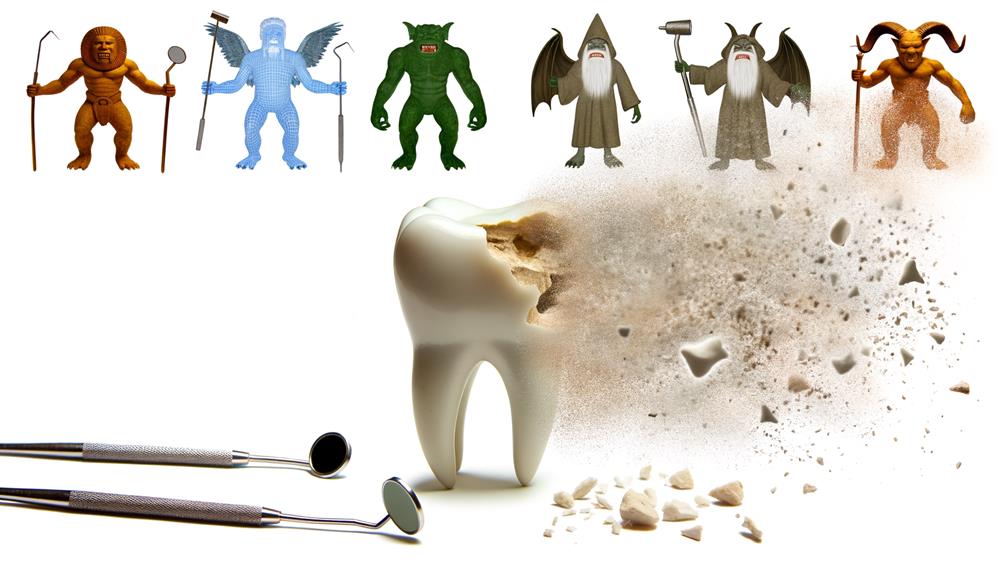Key Takeaways
- Sugar is not the direct cause of cavities; it is the bacteria in the mouth that feed on sugar and produce acids that erode tooth enamel.
- Maintaining good oral hygiene habits, such as brushing twice a day with fluoride toothpaste, flossing daily, and visiting the dentist regularly, is crucial for cavity prevention.
- It’s not just candy and desserts that can lead to tooth decay; carbohydrates can also be broken down into sugars, emphasizing the need for comprehensive dental care.
- Baby teeth are essential for the future oral health of children, as they serve as natural space holders for permanent teeth, and neglecting their care can lead to dental issues and potential long-term consequences.
Sugar Is the Main Cause of Cavities
While it’s often said that sugar is the main culprit behind cavities, the truth is that it’s not sugar alone, but the reaction it causes in your mouth that leads to dental decay. When you consume sugary foods or drinks, you’re not just satisfying a sweet tooth; you’re also feeding the oral bacteria that thrive on your sugar intake. These bacteria produce acids that attack tooth enamel and initiate the cavity formation process. To master cavity prevention, you must practice disciplined oral hygiene and moderate your consumption of sugars and carbohydrates, which oral bacteria can convert into harmful acids. You don’t have to eliminate sugar, but understanding its impact and opting for sugar substitutes when possible can make a significant difference. Moreover, be aware that it’s not just the obvious sweets; even complex carbohydrates can ultimately contribute to the acid production that damages teeth.Baby Teeth Don’t Require Proper Care
Every baby tooth counts when it comes to your child’s long-term oral health; neglecting them can lead to serious dental issues down the line. The baby teeth importance can’t be overstated—they are fundamental to early dental development. Here’s why you need to give those primary teeth the attention they deserve:- Space Maintenance: Baby teeth hold the correct spacing for permanent teeth, preventing future misalignment.
- Nutrition and Speech: Healthy primary teeth enable proper chewing and speech development, impacting overall well-being.
- Pain Prevention: Cavities in baby teeth can cause unnecessary pain and even infection, affecting your child’s daily life.
- Oral Health Foundation: Caring for baby teeth sets a precedent for lifelong oral hygiene habits.
Professional Dental Treatments Are Too Expensive

Routine Oral Hygiene Is Enough to Maintain Dental Health
You might believe that sticking to a strict routine of brushing and flossing is all it takes to keep your dental health in check, but there’s more to the story. True mastery of dental health extends beyond the basics you’re accustomed to. Here’s what you need to consider:- Importance of Regular Dental Check-Ups:
- Proper Brushing Techniques:
- The Role of Fluoride in Cavity Prevention:
- The Impact of Diet on Oral Health:
It’s Too Late to Start Practicing Good Oral Care Habits
Dispelling the myth that it’s too late to start good oral care habits is crucial, as initiating a regimen at any age can significantly improve your dental health. The importance of early dental care can’t be overstated, but it’s never too late to overcome barriers to good oral health. You might think the damage is done, especially if you’ve neglected your teeth in the past, but the body’s ability to heal and adapt is remarkable. The impact of neglecting baby teeth demonstrates the long-term benefits of preventative dental care. Just as untreated issues in the early years can lead to complications later on, adopting healthy habits as an adult can prevent further damage and even reverse some effects of past neglect. It’s about making positive changes now that will benefit you for years to come. Education plays a vital role in oral health awareness, guiding you through the steps necessary to maintain a healthy mouth. By understanding the basics of dental care and the consequences of neglect, you can take informed action.Frequently Asked Questions
Can Using Hard-Bristled Toothbrushes Lead to Better Plaque Removal?
You might think harder bristles mean cleaner teeth, but that’s not the case. Hard-bristled toothbrushes can cause gum damage and enamel wear. The key is proper brushing technique, not bristle hardness. A softer brush prevents sensitivity increase and cleans effectively.Is It True That You Should Wait to Brush Your Teeth After Eating Acidic Food or Drinks?
Yes, you should wait to brush your teeth after consuming acidic foods or drinks. Diving straight into brushing can lead to acid erosion. Instead, give your saliva time to work its protective magic, aiding enamel remineralization. The optimal brushing time is 30 minutes post-acid exposure, allowing dietary acids to be neutralized. This practice shields your smile and ensures acid erosion prevention, keeping your dental health on a winning streak.Do Whitening Toothpaste Improve the Health of Your Teeth or Just Their Appearance?
Whitening toothpastes may brighten your smile by removing surface stains, but they’re not enhancing tooth health. In fact, some contain harsh whitening agents that can threaten enamel safety and increase sensitivity concerns. Be wary of long-term effects and prioritize products that protect and strengthen enamel. For substantial health benefits, focus on toothpastes that offer more than just cosmetic perks.Are Dental X-Rays Dangerous and Should Be Avoided as Much as Possible?
Dental x-rays have a low radiation risk, especially with today’s digital advancements. They’re critical for diagnosing hidden issues. Pediatric concerns are mitigated by protective measures like lead aprons. The frequency debate continues, but they shouldn’t be avoided outright. Trust your dentist to recommend x-rays judiciously, balancing safety with the need for informed dental care. You’re better off following their tailored advice than missing essential diagnostics.Can the Alignment of Your Teeth Affect Your Overall Health, Beyond Just Dental Health?
Your teeth’s alignment can dramatically shape your overall health! Orthodontic benefits extend far beyond a stunning smile. Misaligned teeth can be accomplices in heart disease, disrupt your digestive system, and even trigger chronic headaches. They’re also implicated in respiratory issues, proving that straight teeth aren’t just about aesthetics—they’re a health imperative. As you master your well-being, remember that aligning your teeth is aligning your life!What are some common dental health myths that people should be aware of to avoid making mistakes in dental care?
There are several common dental health myths that people should be aware of to avoid common dental care mistakes. One myth is that brushing harder will result in cleaner teeth, but in reality, it can damage the enamel. Another myth is that sugar is the only cause of cavities, but acidic foods can also be harmful to teeth.


